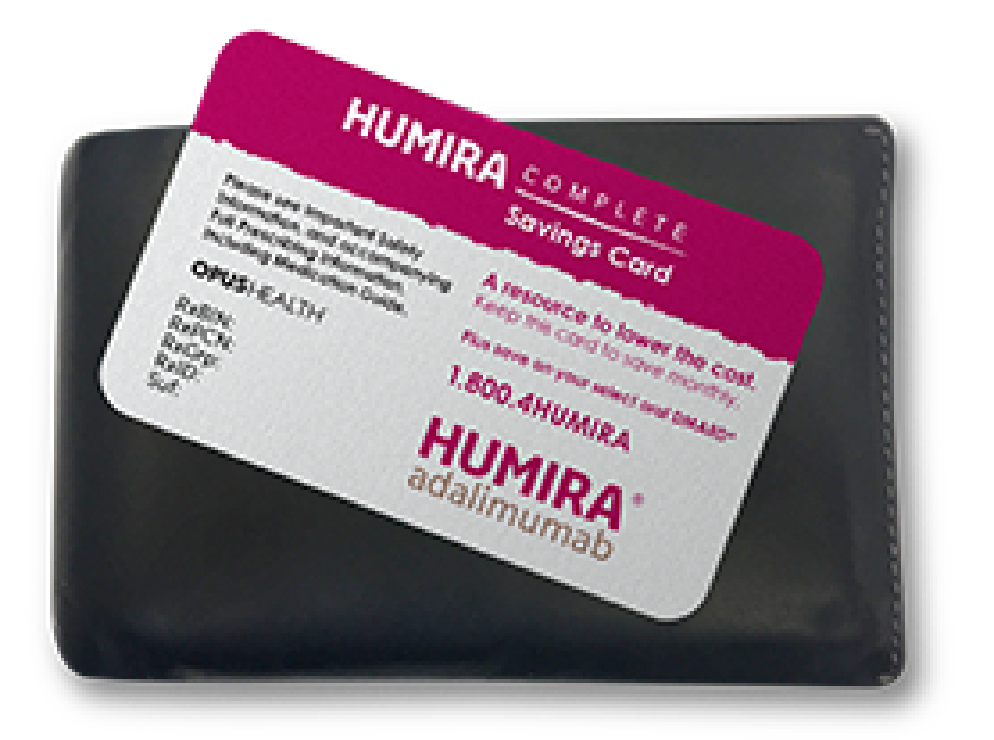IMPORTANT SAFETY INFORMATION for HUMIRA (adalimumab)1
SERIOUS INFECTIONS
Patients treated with HUMIRA are at increased risk for developing serious infections that may lead to hospitalization or death. Most patients who developed these infections were taking concomitant immunosuppressants such as methotrexate or corticosteroids.
Discontinue HUMIRA if a patient develops a serious infection or sepsis.
Reported infections include:
- Active tuberculosis (TB), including reactivation of latent TB. Patients with TB have frequently presented with disseminated or extrapulmonary disease. Test patients for latent TB before HUMIRA use and during therapy. Initiate treatment for latent TB prior to HUMIRA use.
- Invasive fungal infections, including histoplasmosis, coccidioidomycosis, candidiasis, aspergillosis, blastomycosis, and pneumocystosis. Patients with histoplasmosis or other invasive fungal infections may present with disseminated, rather than localized, disease. Antigen and antibody testing for histoplasmosis may be negative in some patients with active infection. Consider empiric anti-fungal therapy in patients at risk for invasive fungal infections who develop severe systemic illness.
- Bacterial, viral, and other infections due to opportunistic pathogens, including Legionella and Listeria.
Carefully consider the risks and benefits of treatment with HUMIRA prior to initiating therapy in patients: 1. with chronic or recurrent infection, 2. who have been exposed to TB, 3. with a history of opportunistic infection, 4. who resided in or traveled in regions where mycoses are endemic, 5. with underlying conditions that may predispose them to infection. Monitor patients closely for the development of signs and symptoms of infection during and after treatment with HUMIRA, including the possible development of TB in patients who tested negative for latent TB infection prior to initiating therapy.
- Do not start HUMIRA during an active infection, including localized infections.
- Patients older than 65 years, patients with co-morbid conditions, and/or patients taking concomitant immunosuppressants may be at greater risk of infection.
- If an infection develops, monitor carefully and initiate appropriate therapy.
- Drug interactions with biologic products: A higher rate of serious infections has been observed in RA patients treated with rituximab who received subsequent treatment with a TNF blocker. An increased risk of serious infections has been seen with the combination of TNF blockers with anakinra or abatacept, with no demonstrated added benefit in patients with RA. Concomitant administration of HUMIRA with other biologic DMARDs (e.g., anakinra or abatacept) or other TNF blockers is not recommended based on the possible increased risk for infections and other potential pharmacological interactions.
MALIGNANCY
Lymphoma and other malignancies, some fatal, have been reported in children and adolescent patients treated with TNF blockers, including HUMIRA. Postmarketing cases of hepatosplenic T-cell lymphoma (HSTCL), a rare type of T-cell lymphoma, have been reported in patients treated with TNF blockers, including HUMIRA. These cases have had a very aggressive disease course and have been fatal. The majority of reported TNF blocker cases have occurred in patients with Crohn’s disease or ulcerative colitis and the majority were in adolescent and young adult males. Almost all of these patients had received treatment with azathioprine or 6-mercaptopurine concomitantly with a TNF blocker at or prior to diagnosis. It is uncertain whether the occurrence of HSTCL is related to use of a TNF blocker or a TNF blocker in combination with these other immunosuppressants.
- Consider the risks and benefits of HUMIRA treatment prior to initiating or continuing therapy in a patient with known malignancy.
- In clinical trials, more cases of malignancies were observed among HUMIRA-treated subjects compared to control subjects.
- Non-melanoma skin cancer (NMSC) was reported during clinical trials for HUMIRA-treated subjects. Examine all patients, particularly those with a history of prolonged immunosuppressant or PUVA therapy, for the presence of NMSC prior to and during treatment with HUMIRA.
- In HUMIRA clinical trials, there was an approximate 3-fold higher rate of lymphoma than expected in the general U.S. population. Patients with chronic inflammatory diseases, particularly those with highly active disease and/or chronic exposure to immunosuppressant therapies, may be at higher risk of lymphoma than the general population, even in the absence of TNF blockers.
- Postmarketing cases of acute and chronic leukemia were reported with TNF blocker use. Approximately half of the postmarketing cases of malignancies in children, adolescents, and young adults receiving TNF blockers were lymphomas; other cases included rare malignancies associated with immunosuppression and malignancies not usually observed in children and adolescents.
HYPERSENSITIVITY
- Anaphylaxis and angioneurotic edema have been reported following HUMIRA administration. If a serious allergic reaction occurs, stop HUMIRA and institute appropriate therapy.
HEPATITIS B VIRUS REACTIVATION
- Use of TNF blockers, including HUMIRA, may increase the risk of reactivation of hepatitis B virus (HBV) in patients who are chronic carriers. Some cases have been fatal.
- Evaluate patients at risk for HBV infection for prior evidence of HBV infection before initiating TNF blocker therapy.
- Exercise caution in patients who are carriers of HBV and monitor them during and after HUMIRA treatment.
- Discontinue HUMIRA and begin antiviral therapy in patients who develop HBV reactivation. Exercise caution when resuming HUMIRA after HBV treatment.
NEUROLOGIC REACTIONS
- TNF blockers, including HUMIRA, have been associated with rare cases of new onset or exacerbation of central nervous system and peripheral demyelinating diseases, including multiple sclerosis, optic neuritis, and Guillain-Barré syndrome.
- Exercise caution when considering HUMIRA for patients with these disorders; discontinuation of HUMIRA should be considered if any of these disorders develop.
- There is a known association between intermediate uveitis and central demyelinating disorders.
HEMATOLOGIC REACTIONS
- Rare reports of pancytopenia, including aplastic anemia, have been reported with TNF blockers. Medically significant cytopenia has been infrequently reported with HUMIRA.
- Consider stopping HUMIRA if significant hematologic abnormalities occur.
CONGESTIVE HEART FAILURE
- Worsening and new onset congestive heart failure (CHF) has been reported with TNF blockers. Cases of worsening CHF have been observed with HUMIRA; exercise caution and monitor carefully.
AUTOIMMUNITY
- Treatment with HUMIRA may result in the formation of autoantibodies and, rarely, in development of a lupus-like syndrome or autoimmune hepatitis. Discontinue treatment if symptoms and findings suggestive of a lupus-like syndrome or autoimmune hepatitis develop.
IMMUNIZATIONS
- Patients on HUMIRA should not receive live vaccines.
- Pediatric patients, if possible, should be brought up to date with all immunizations before initiating HUMIRA therapy.
- Adalimumab is actively transferred across the placenta during the third trimester of pregnancy and may affect immune response in the in utero exposed infant. The safety of administering live or live-attenuated vaccines in infants exposed to HUMIRA in utero is unknown. Risks and benefits should be considered prior to vaccinating (live or live-attenuated) exposed infants.
ADVERSE REACTIONS
- The most common adverse reactions in HUMIRA clinical trials (>10%) were: infections (e.g., upper respiratory, sinusitis), injection site reactions, headache, and rash.
INDICATIONS1
- Rheumatoid Arthritis: HUMIRA is indicated, alone or in combination with methotrexate or other non-biologic DMARDs, for reducing signs and symptoms, inducing major clinical response, inhibiting the progression of structural damage, and improving physical function in adult patients with moderately to severely active rheumatoid arthritis.
- Juvenile Idiopathic Arthritis: HUMIRA is indicated, alone or in combination with methotrexate, for reducing signs and symptoms of moderately to severely active polyarticular juvenile idiopathic arthritis in patients 2 years of age and older.
- Psoriatic Arthritis: HUMIRA is indicated, alone or in combination with non-biologic DMARDs, for reducing signs and symptoms, inhibiting the progression of structural damage, and improving physical function in adult patients with active psoriatic arthritis.
- Ankylosing Spondylitis: HUMIRA is indicated for reducing signs and symptoms in adult patients with active ankylosing spondylitis.
- Crohn’s Disease: HUMIRA is indicated for the treatment of moderately to severely active Crohn’s disease in adults and pediatric patients 6 years of age and older.
- Ulcerative Colitis: HUMIRA is indicated for the treatment of moderately to severely active ulcerative colitis in adults and pediatric patients 5 years of age and older.
Limitations of Use:
The effectiveness of HUMIRA has not been established in patients who have lost response to or were intolerant to TNF blockers.
- Plaque Psoriasis: HUMIRA is indicated for the treatment of adult patients with moderate to severe chronic plaque psoriasis who are candidates for systemic therapy or phototherapy, and when other systemic therapies are medically less appropriate. HUMIRA should only be administered to patients who will be closely monitored and have regular follow-up visits with a physician.
- Hidradenitis Suppurativa: HUMIRA is indicated for the treatment of moderate to severe hidradenitis suppurativa in patients 12 years of age and older.
- Uveitis: HUMIRA is indicated for the treatment of non-infectious intermediate, posterior, and panuveitis in adults and pediatric patients 2 years of age and older.
Please see Full Prescribing Information.
US-HUM-250108




